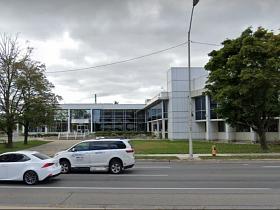LEVY: North York refugee shelter to be 'activated'
City officials are expected to announce plans Wednesday to “activate” a site in north Toronto to transition refugees now staying in GTA hotels and motels, the Toronto Sun has learned.
The former North York hydro site — on Yonge St., north of Finch — has been on hold as “contingency space” since early in the year. That’s when the Toronto Sun found an obscure $3-million line item in the 2019 budget under new and enhanced priorities — described as the costs to transition motel clients to 5,800 Yonge St.
Last Friday, city spokesman Andrea Gonsalves– in response to a query about whether the property will be used this winter — said the “activation” of 5,800 Yonge St. would be announced as part of the city’s “overall winter operations plan” (for homeless and refugee clients) in “the coming weeks.”
However, a source who asked not to be named, told the Sun Tuesday the announcement is likely to come Wednesday morning with the space to be ready to house up to 400 refugees in about two weeks.
The source said Willowdale Councillor John Filion will tell impacted North York community residents about the use of the venue on Thursday. The announcement will come just before Mayor John Tory jets off to New York City on a two-day mission to “encourage foreign direct investment” in a variety of competitive and diverse sectors, particularly in Toronto’s technology sector.
A statement sent out Tuesday afternoon says Tory will meet with 14 companies.
Meanwhile, pictures of the interior of 5800 Yonge St. show a series of cots lined up and Tuesday city staff and contractors were on site at the building.
The property was sold to a Markham-based condominium developer in April , 2018. Shelter, Support and Housing (SSHA) official Greg Seraganan told me back in February that the owner of the property approached the city to assist with its refugee response and that it was being held as “contingency space.”
Seraganian insisted at the time that the “appropriate notice and information sessions” with the community would be provided if the site was to be activated.
But the source said the community has no idea what’s coming — which seems to be the way city officials and the politicians operate as of late, using the so-called emergency shelter crisis as an excuse.
Asked whether refugees are still coming to Toronto at the same rate, Gonsalves said Tuesday that as of Sept. 27, there were 392 refugee claimants in the shelter system and from Oct. 3-9, another 158 new claimants arrived in Toronto seeking shelter.
“Over the last 18 months, we have seen a gradual increase in the number of refugee and asylum claimant families seeking access to shelter programs through our central intake service,” she said.
“A steady flow of new arrivals fill available space and the placement list for families continues to grow,” she added, noting that in October, 36% of the spaces in the permanent shelter system were occupied by refugee and asylum claimants.
Gonsalves said as of Monday night, 66% of those claimants who provided demographic data listed their country of origin as Nigeria. The remaining top five countries of origin include Ethiopia, Mexico, Uganda and Sudan.
Last week at city council, SSHA general manager Mary-Anne Bedard was put on the hot seat for signing a secret 10-year lease deal in early August for a Carlton-Parliament Sts.-area building without advising the already beleaguered Cabbagetown community beforehand.
The latest site in that area is less than one kilometre from a controversial drug overdose prevention site operated by Street Health on Dundas St. E. That site has wreaked havoc on the surrounding neighbourhood with repeated reports of lawlessness, harassment, drug dealing, prostitution, noise and break-ins.
The Carlton site — which is expected to cost nearly $10-million to lease and renovate — will house a relocated 24-7 drop-in centre and shelter now located on Adelaide St. E.





